As the traditional concept of retirement evolves, many retirees find themselves without a pension plan to depend upon, leaving them to lean on their workplace retirement plans or personal savings. To navigate this shift, it's imperative to develop a robust retirement strategy tailored to ensure a comfortable future.

Retirement planning for the "middle-class millionaires" or those who've accumulated substantial savings, involves several strategic pillars:
For those with sizeable assets, special attention should be paid to tax strategy and risk management. Here’s what to consider:
One of the most overlooked aspects in retirement planning is taxation. It's not enough to simply accumulate a "magic number" or a specific amount of savings; you must also have a tax strategy in place. Without considering the impact of taxes, you could see your net retirement income reduced more than necessary.
If these strategies are executed effectively, retirees can anticipate a relaxed lifestyle, focused on enjoying time with family, traveling, or pursuing hobbies and interests free from financial anxiety.
To craft a successful retirement plan, it's beneficial to work with financial experts. The right offer includes a comprehensive retirement plan consultation, analyzing your current situation and discussing the best steps forward for a fruitful retirement. This plan should be a customized road map that provides clarity and actionable advice to ensure you reach your desired retirement goals.
If you've diligently saved for retirement, don't underestimate the importance of a detailed plan. Engage with financial advisors who can offer a full-blown retirement planning session. This collaborative approach ensures all factors are considered, from social security optimization to tax efficiency, ultimately guiding you towards a retirement you can truly enjoy.
In conclusion, a well-designed retirement strategy is your guide to a worry-free retirement phase. Prioritize these considerations now, and you'll thank yourself later as you enjoy a comfortable and stress-free retirement.
Welcome to the Finance Report. When it comes to navigating life's tasks, a checklist can provide clarity and direction — the same applies to planning for retirement. A well-crafted retirement strategy is akin to a checklist; it's a step-by-step guide to ensure you make the most of your golden years.
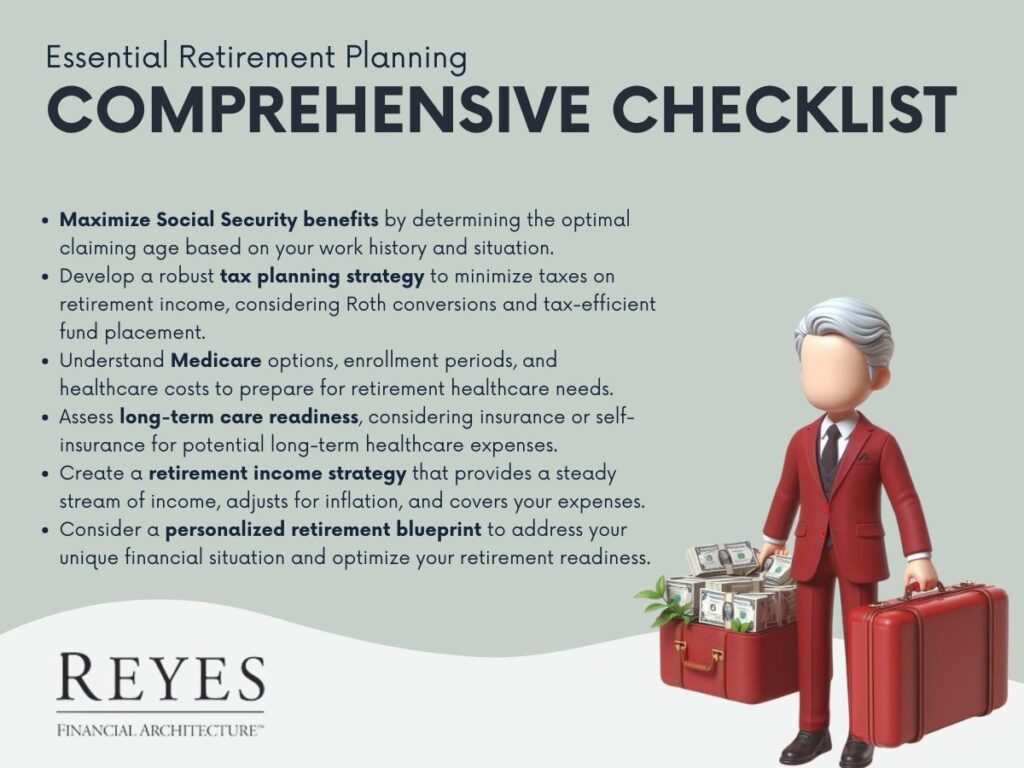
Tax planning is integral to a successful retirement as it can significantly impact your net income. With tax rates susceptible to change and inflation presenting an ongoing challenge, it's important to consider strategies such as Roth conversions, tax-efficient fund placement, and timed withdrawals.
For those who have diligently saved, there's a unique opportunity to receive professional assistance to craft a personalized retirement blueprint. This service is designed to layout a framework that addresses your current financial standings and the optimal routes to achieve retirement readiness.
If you're interested in developing a detailed retirement strategy, consider reaching out for a consultation. Having a financial roadmap in place is crucial. It will allow for a thorough analysis of your current situation and will enable an informed discussion on your best options moving forward.
Remember, every checklist item is an integral step towards a retirement that's as secure and enjoyable as possible. Take the time now to address each aspect, and put yourself on the path to a successful and fulfilling retirement. If you've reached that milestone of significant savings, seize this exclusive chance to work with financial planning professionals to help ensure your retirement years are spent with peace of mind and financial stability. Reach out now to start mapping your journey to a rewarding retirement.
When planning for retirement, it's easy to fixate on a specific number as the goalpost for financial security. The question of whether a million dollars is enough for a comfortable retirement is common, and it's significant to dissect why this "magic number" approach isn't always reliable.

The idea of a universal magic number for retirement savings, such as one million dollars, is misleading. Arriving at an accurate estimate of how much you'll need is far more complex and personal. It varies greatly depending on lifestyle choices, location, healthcare needs, inflation rates, and countless other variables.
Believing you've saved "enough" based on achieving this magic number can lead to a false sense of security. The key is not necessarily the amount saved but whether those savings can provide the income needed for your entire retirement. Several factors need to be considered:
Instead of pursuing a universally accepted magic number, it's more beneficial to focus on a custom-fit strategy that details how much income will be required to maintain your desired retirement lifestyle. This approach considers not just savings but also potential income sources and expenditures.
A comprehensive retirement income plan is centered around determining the monthly or annual income needed to support you comfortably. Investment strategies can then be designed to meet or exceed that income requirement reliably.
For those who have diligently accumulated savings, explore tailored financial planning services. Finding the right financial advisor to craft a detailed retirement blueprint can be invaluable. This blueprint should provide a clear breakdown of current financial standings and actionable steps tailored to individual retirement goals.
If you've been aiming for a predetermined magic number for retirement, it's crucial to re-evaluate your approach. Now is the time to consider comprehensive financial planning that focuses on income replacement rather than a singular savings goal. In summary, while amassing a million dollars in savings is a laudable achievement, it's critical to understand the nuances of your unique retirement situation.
By doing so, you create a future that allows you to relish your retirement years with confidence, comfort, and peace of mind. If you're ready to advance beyond the oversimplified "magic number" and dive into a more meaningful retirement planning process, don't hesitate to reach out for a professional retirement plan tailored just for you.
Welcome to The Money Report, where today's focus is on the importance of a retirement planning checklist. Much like daily checklists keep our lives organized, a retirement checklist can be a valuable tool in securing your financial future.
A well-rounded retirement checklist covers all the bases, from income and taxes to healthcare and estate planning.
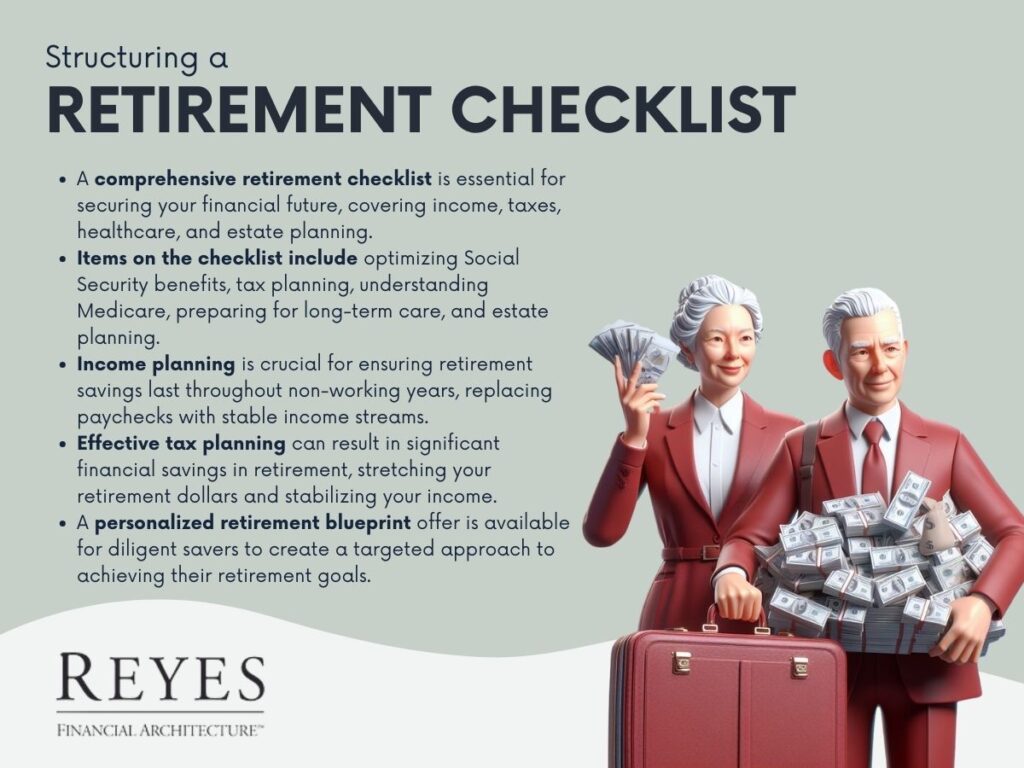
Income planning is indispensable in transitioning from accumulation to drawing down your assets. Without a clear income plan, it's challenging to ensure that your retirement savings last throughout your non-working years. Effective income planning assures that you replace your paycheck with stable income streams, adjusting for inflation and market changes.
Taking control of your tax situation in retirement could mean significant financial savings. From optimizing withdrawal strategies to considering Roth conversions, the right tax maneuvers can stretch your retirement dollars further and reinforce the stability of your income plan.
Recognizing the intricate nature of retirement planning, there's a special offer for those who have been conscientious savers. By reaching out now, you can collaborate with a team committed to helping you craft a personalized retirement blueprint. This customized plan evaluates your current financial status and your retirement vision, allowing for a targeted approach to achieving your goals.
Getting ready for retirement involves more than reaching a certain savings threshold—it's about constructing a plan that considers all financial aspects that come into play during your golden years. If you have diligently saved and want to take the next step in your retirement planning, consider this offer to strategize your future financial endeavors.
Call now to schedule a time to sit down and discuss the composition of your retirement checklist. This could be the first step toward a retirement defined by financial peace and personal fulfillment.
Welcome to The Finance Report. As one plans for a comfortable retirement, taxes often fly under the radar, yet they can become one of the most substantial expenses if not managed correctly. In the current political climate, with taxes on the rise and inflation hitting a 30-year high at over six percent, it's more important than ever to have a tax-efficient retirement strategy. Here's why taxes should be at the forefront of your retirement planning and how overlooking them could cost you.
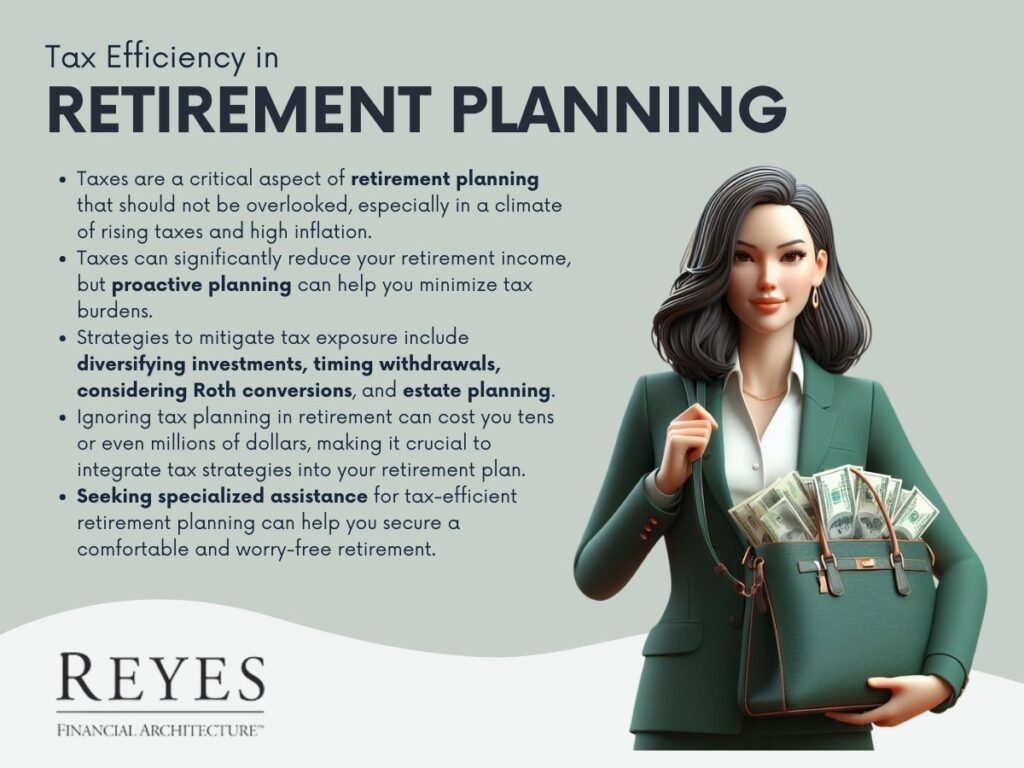
Taxes in retirement can significantly reduce the amount of money you have to live on. With potential increases in income taxes, capital gains taxes, and estate taxes, proactive planning can prevent you from paying more than necessary.
For instance, up to 85% of your Social Security benefits could be taxable, depending on your income. However, with strategic planning, you might reduce the taxes owed on these benefits and other retirement income, thereby increasing your available funds.
Various strategies can be employed to minimize tax exposure in retirement:
Without a nuanced understanding of how taxes play into retirement savings, one could end up paying significantly more than necessary. Depending on one’s financial situation, the cost could be in the tens or even millions of dollars, stressing the importance of integrating tax planning into your overall retirement strategy.
Those who have saved diligently for retirement have a unique chance to build a comprehensive retirement blueprint with financial professionals. This personalized plan will lay out a detailed analysis of your current financial status and equip you with the roadmap needed to navigate retirement taxes efficiently and optimize your retirement income.
If you're looking to ensure that every penny of your retirement savings works as hard for you as you did for it, now is the time to be proactive about your tax planning strategy. By reaching out for specialized assistance, you'll be taking an essential step towards securing a successful retirement.
Reviewing your tax situation now can save you significant sums in the long run, providing you with the freedom to enjoy your retirement to the fullest. Don't let inefficient tax planning rob you of your rightfully earned comfort during your retirement years. Instead, reach out today to secure a financial plan that considers all aspects of your later life.
In the world of financial planning, there's often talk of a "magic number" for retirement—a presumed amount of savings that supposedly guarantees a carefree post-work life. The question on many people's minds is if a million dollars serves as the golden benchmark for a sufficient retirement nest egg. However, pinpointing an exact number is far too simplistic and can disguise the intricate reality of retirement finances.
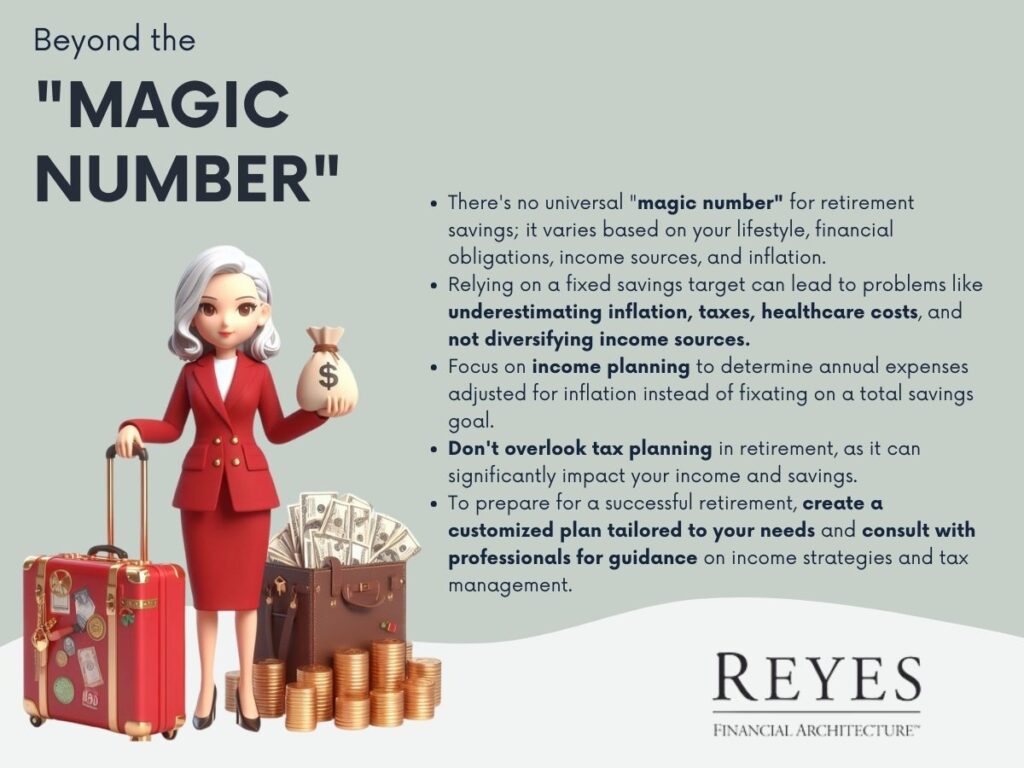
The notion of a one-size-fits-all "magic number" for retirement savings is a myth. The amount you'll need to live comfortably in retirement varies greatly based on several factors, including:
Chasing a fixed savings number without a comprehensive plan can lead to potential pitfalls down the road. These may include underestimating the effects of inflation and taxes, not planning for healthcare and long-term care costs, and failing to cultivate diverse income streams. The focus should shift from attaining a specific dollar amount to ensuring reliable, sufficient cash flow throughout retirement.
The strategic planning of income is essential. Even substantial savings can quickly deplete if not managed correctly, especially considering life expectancy, increasing medical expenses, and potential long-term care needs. Therefore, determining how much you need annually to cover all expenses, adjusted for inflation, should be the primary concern, rather than focusing solely on a total savings goal.
Tax planning is an often-overlooked pillar of retirement planning. It's essential to understand how taxes can impact your retirement income and overall savings. Tax inefficiency can cost you significantly, so consider consulting with a financial planner to explore options for managing taxes efficiently in retirement.
If you've been diligently saving with an arbitrary number in mind, it's crucial to start developing a comprehensive plan tailored to your needs. By doing so, you can better position yourself to maintain the lifestyle you desire in retirement and avoid common financial oversights.
To help you on the path to a successful and thoroughly planned retirement, consider reaching out for a professionally crafted retirement roadmap. With a comprehensive analysis and strategic advice, you can more confidently embark on this next life phase, knowing your financial well-being is safeguarded.
Remember, the quality of your retirement is not solely determined by how much you've saved—it's about ensuring those savings are structured to provide a stable and enduring income. If you're ready to go beyond the superficial "magic number" and embark on a journey to a retirement filled with certainty and enjoyment, now is the time to take that first step. Contact the provided number to begin crafting a detailed retirement plan tailored just for you.
Welcome to The Money Report. When we think of retirement expenses, we often consider basic needs like food, clothing, and healthcare. Yet, it might come as a surprise that for many, taxes could end up being the most significant retirement expense of all. With tax rates on the rise, crafting a strategy to mitigate these costs is more critical than ever.
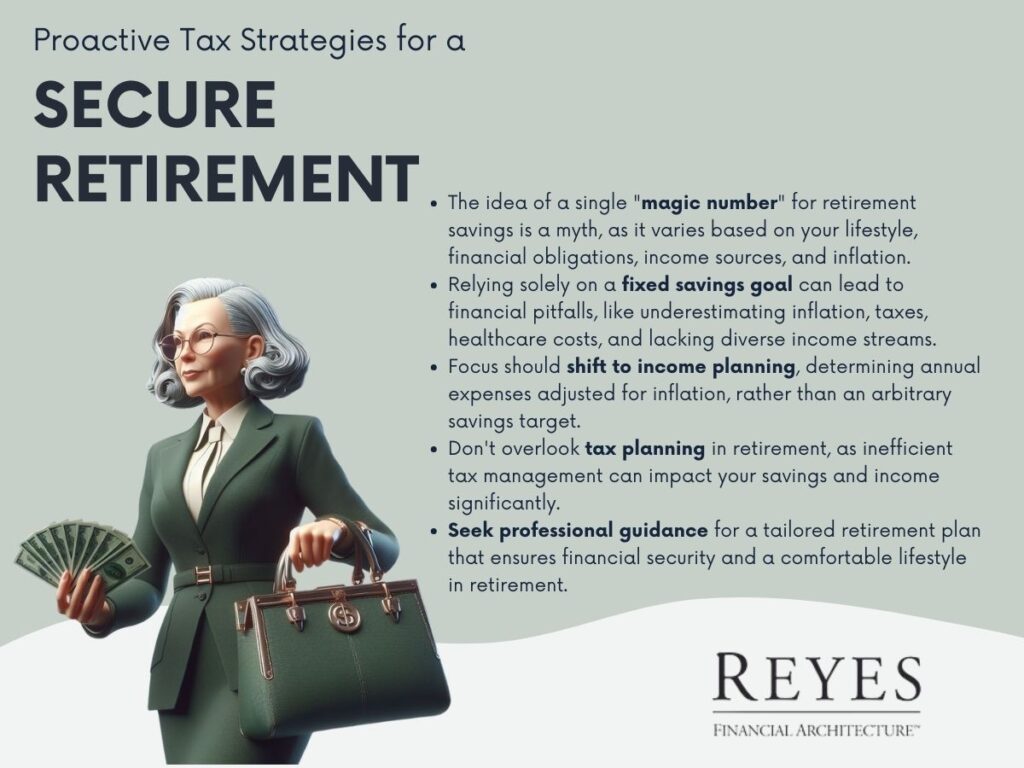
When it comes to retirement, proactive tax planning is essential. Without it, you could be facing tens or even hundreds of thousands of dollars in unnecessary tax liabilities. Between capital gains taxes on home sales and income tax on retirement distributions, the potential for overspending on taxes is substantial.
There are effective strategies to lower your tax burden:
Income planning is pivotal for retirement because it is essentially about replacing your work paycheck with other revenue streams—funds that need to last through your retirement years. A comprehensive income plan hinges on understanding your expected expenses, contemplating inflation adjustments, and considering the longevity of your portfolio.
For those within reach of retirement, particularly if you have a portfolio of significant value, there's the opportunity to receive personalized guidance through a complimentary retirement planning session. This planning includes an assessment of your current financial situation, a discussion of your financial goals, and the crafting of a tailored path to a secure retirement.
If you're eager to shore up your retirement planning, particularly with tax strategies to protect your nest egg, consider reaching out. There has never been a more critical time to ensure your financial affairs are in order, as a well-planned approach can make all the difference in how comfortably you can live in retirement.
Remember, retirement planning is not only about accumulating wealth—it's about making wise decisions on how to sustain and enjoy that wealth throughout your retirement years. Take the necessary steps now to put yourself in the best possible position for a successful retirement.
If you're ready to take action towards a tax-efficient, financially secure retirement, pick up the phone and get started today. With expert advice and a concrete retirement plan, you can confidently look forward to the future you've worked so hard to achieve.
For years, the concept of retiring with a million dollars has been touted as the ultimate financial goal for a comfortable post-work life. However, this "magic number" approach to retirement planning is increasingly being scrutinized for its over-simplification of a complex issue.
The reality is that retirement planning is not a one-size-fits-all endeavor, and relying solely on a predetermined amount like one million dollars can lead to significant financial challenges and a false sense of security.
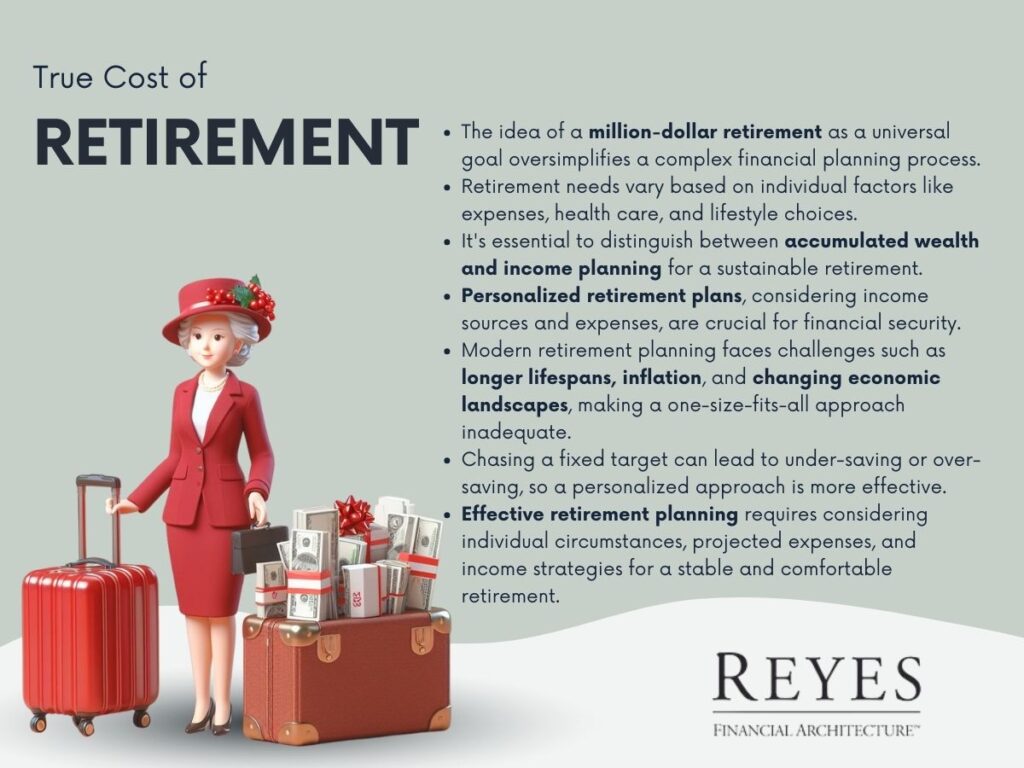
The amount required for retirement is highly individualistic and depends on numerous factors. These include living expenses, health care needs, lifestyle choices, inflation, and unexpected costs. David Reyes, a financial expert, emphasizes the importance of personalized planning.
He notes that while a million dollars might be sufficient for someone with a pension, no debt, and a paid-off home, it could be inadequate for others, especially those without a pension or those carrying substantial debt into retirement.
A crucial aspect often overlooked in retirement planning is the distinction between accumulated wealth and income planning. Accumulated wealth refers to the total amount saved, whereas income planning focuses on the regular income that these savings will generate during retirement. This distinction is vital because having a large savings pot doesn't automatically translate into a sustainable income stream.
The key to successful retirement planning lies in understanding your specific income needs in retirement, not just aiming for a magic number. This requires a thorough analysis of current financial status, future income sources, and expected expenses.
Financial advisors like David Reyes often offer comprehensive retirement plans that provide a roadmap tailored to individual circumstances. Such plans help in identifying the right strategies to ensure a steady income flow throughout retirement.
The concept of a million-dollar retirement stems from a time when market conditions, life expectancies, and retirement lifestyles were significantly different. Today, longer life spans and changing economic landscapes mean that retirement funds need to last longer and cover more. Inflation, healthcare costs, and the potential decline of social security benefits add further complexity to modern retirement planning.
Pursuing a fixed target, like one million dollars, without considering personal circumstances can lead to problematic financial decisions. For instance, it might lead to under-saving for those with more expensive lifestyles or health issues. Conversely, it could also result in over-saving and unnecessary sacrifice during working years for those with modest retirement goals.
In conclusion, while the concept of a million-dollar retirement is appealing in its simplicity, it falls short in addressing the complexities of individual financial needs. Effective retirement planning requires a nuanced approach that considers personal circumstances, projected expenses, and income strategies.
Rather than chasing a universal magic number, individuals should focus on creating a personalized plan that ensures a stable and adequate income throughout their retirement years. This approach not only provides financial security but also peace of mind, knowing that their retirement plan is tailored to their unique life journey.
Retirement planning is an essential aspect of financial management, requiring careful thought and preparation. It involves considering various elements that contribute to a financially secure and comfortable retirement. This guide provides insights into the key components of a successful retirement plan.
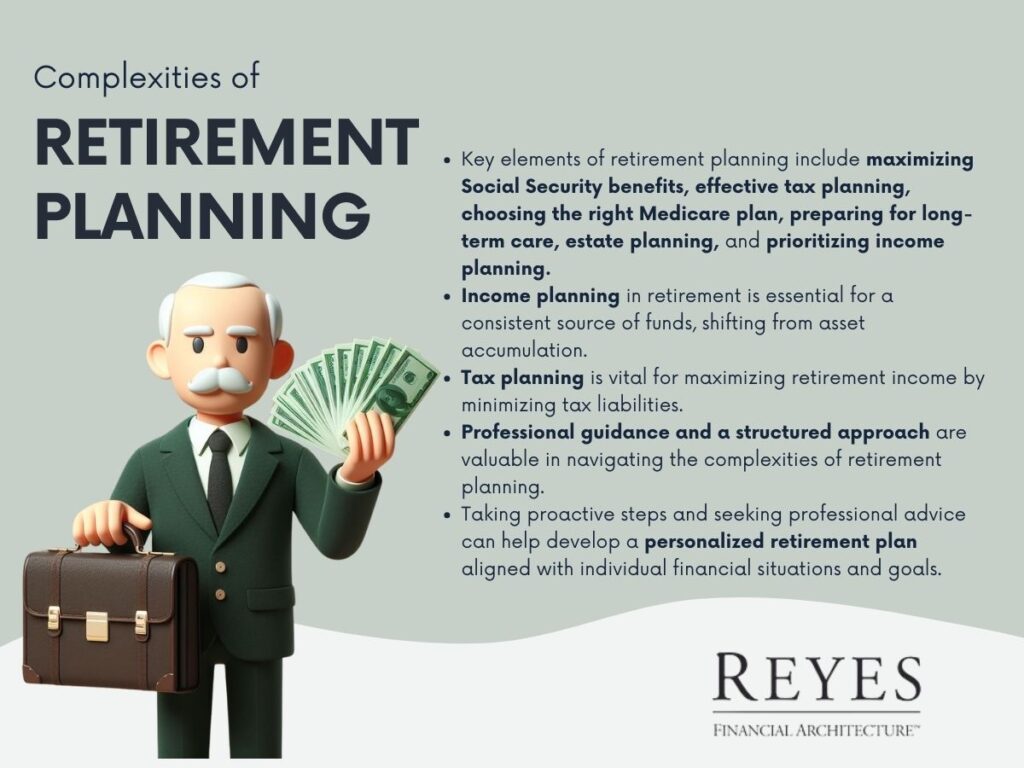
1. Maximizing Social Security Benefits
Understanding the right time and strategy to claim Social Security benefits is crucial for optimizing retirement income.
2. Effective Tax Planning
Strategic tax planning can significantly enhance retirement income by reducing tax burdens. This includes planning for tax-efficient withdrawals from retirement accounts.
3. Medicare and Health Coverage
Choosing the right Medicare plan and understanding its costs are essential for maintaining health coverage in retirement without exhausting savings.
4. Preparing for Long-Term Care
Anticipating and planning for long-term care needs helps protect savings and ensures adequate healthcare in later years.
5. Estate Planning and Living Trusts
Proper estate planning, including the establishment of living trusts, is vital for asset management and protection, both during and after one’s lifetime.
6. Prioritizing Income Planning
Unlike the asset accumulation phase, retirement planning focuses on generating a steady income to support retirement living, necessitating a shift in financial strategy.
In retirement, ensuring a continuous income stream is more critical than focusing solely on asset growth. Income planning is about creating a strategy that provides a reliable and consistent source of funds throughout retirement.
Effective tax planning is key in retirement for maximizing income by minimizing tax liabilities. Understanding the tax implications of retirement withdrawals and investment incomes is fundamental in achieving a more financially secure retirement.
Retirement planning is a multifaceted endeavor, encompassing everything from income generation to healthcare planning and estate management. Each component plays a crucial role in building a comprehensive retirement plan that caters to personal needs and financial goals. A structured approach, along with professional guidance, can be invaluable in navigating the complexities of retirement planning.
For those nearing retirement, it’s important to take proactive steps in planning. Seeking professional advice can be beneficial in developing a personalized retirement plan that aligns with individual financial situations and goals.